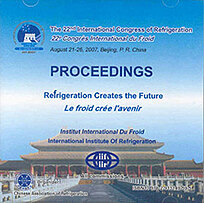
Résumé
A Micro-CT scanner has been used to follow the moving interface during sublimation. Apple slices used as experimental samples were scanned at certain intervals when drying. The scanning images were analysed, then variation curves of grey value were obtained. For different thicknesses, freezing rates and primary drying temperatures, the different sublimation phenomena were compared. The results show that heat and mass exchange occurs both at the upper and the under surfaces of the sample. Also the exchange occurs on the side surface to some extent. To thick samples, the interface showing as a three-dimensional moving mode contracts to the geometric centre of the sample and presents approximate globosity. Samples frozen of slow freezing sublimate more quickly than those of quick freezing. The higher the primary drying temperature is, the more quickly sublimation interface moves. However, samples shrink and collapse more severely with high drying temperature under quick-freezing condition.
Documents disponibles
Format PDF
Pages : ICR07-C1-1299
Disponible
Prix public
20 €
Prix membre*
Gratuit
* meilleur tarif applicable selon le type d'adhésion (voir le détail des avantages des adhésions individuelles et collectives)
Détails
- Titre original : Micro-CT scanning study on effect factors of sublimation interface during freeze-drying.
- Identifiant de la fiche : 2008-0958
- Langues : Anglais
- Source : ICR 2007. Refrigeration Creates the Future. Proceedings of the 22nd IIR International Congress of Refrigeration.
- Date d'édition : 21/08/2007
Liens
Voir d'autres communications du même compte rendu (839)
Voir le compte rendu de la conférence
Indexation
-
Investigation of construction of the food freez...
- Auteurs : HAN Y.
- Date : 21/05/2006
- Langues : Anglais
- Source : ACRA-2006. Proceedings of the 3rd Asian conference on refrigeration and air conditioning.
Voir la fiche
-
MODELLING THERMALLY CONTROLLED FREEZE-DRYING WI...
- Auteurs : ELVIRA C. de, DIAZ M., LOMBRANA I.
- Date : 24/08/1987
- Langues : Anglais
- Source : Development in refrigeration, refrigeration for development. Proceedings of the XVIIth international Congress of Refrigeration.
- Formats : PDF
Voir la fiche
-
CHARACTERIZING OF QUALITY OF QUICK FROZEN POTAT...
- Auteurs : BEKE G.
- Date : 07/08/1983
- Langues : Anglais
- Source : [Refrigeration serving humanity]. Proceedings of the XVIth international Congress of Refrigeration.
- Formats : PDF
Voir la fiche
-
The effect of solid fraction on freeze-drying r...
- Auteurs : TACHIWAKI T., TSUJI N.
- Date : 01/09/2003
- Langues : Anglais
- Source : ADC 2003. Exploring new frontiers in drying technology through innovation in processes and equipment, product quality enhancement, energy-efficient and environment-friendly operations. Proceedings of the 3rd Asia-Pacific Drying Conference + CD-ROM.
Voir la fiche
-
Freeze-drying experiences with troubleshooting.
- Auteurs : WILLEMER H.
- Date : 19/09/1999
- Langues : Anglais
- Source : 20th International Congress of Refrigeration: Refrigeration into the Third Millennium.
- Formats : PDF
Voir la fiche
